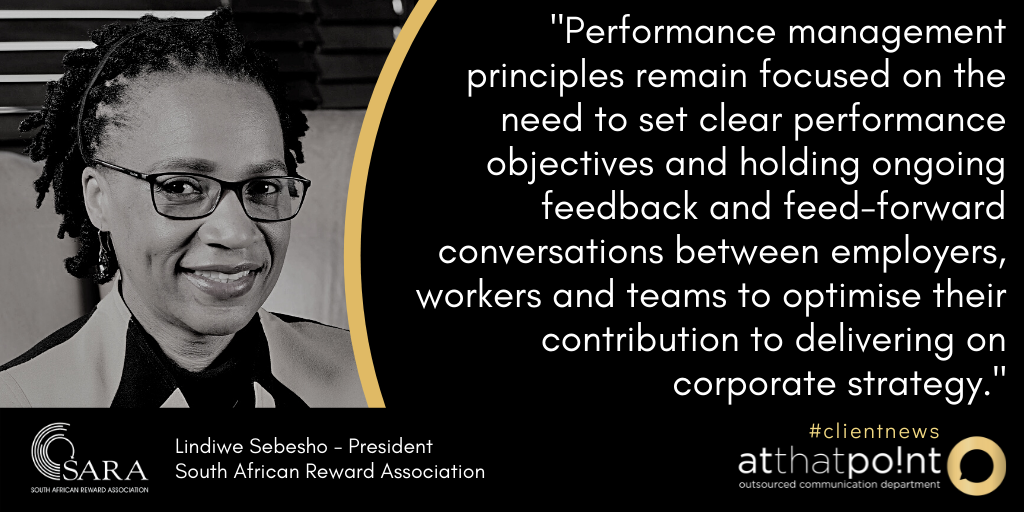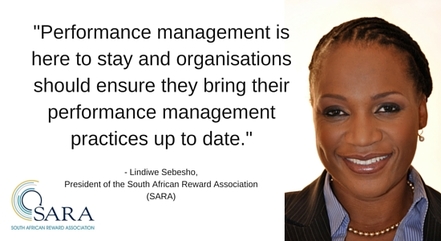|
Apart from the where, when and how of employee performance management, not much has changed since the emergence of COVID-19. This is according to Lindiwe Sebesho, Master Reward Specialist and Executive Committee Member at the South African Reward Association (SARA).
"This is because the key principles in performance management remain relevant in measuring and improving employee contribution to business performance or growth," she says. Performance philosophy Many organisations have become a mix of full time on-premises, fixed-hour staff and work-from-home (WFH) employees with flexible hours. So whilst how their performance is set, monitored and evaluated may be more complex, the need to manage performance remains key for business success. Leveraging technology, most employers are optimising various digital platforms that enable real-time, simple-to-use processes to ease the management of performance across the expanded enterprise. However, performance management principles remain focused on the need to set clear performance objectives and on holding ongoing feedback and feed-forward conversations between employers, workers and teams to optimise their contribution to delivering on corporate strategy. Therefore this process still aims to foster a continuous improvement ethic that focused individuals and teams on activities that drive business growth. Its outcomes are largely still ratings based and are used to inform fair, business-aligned skills development, reward and talent decisions such as succession planning. Key principles Organisations still need to clearly communicate their purpose, growth goals, ambition and strategy within a well-defined business context. Next, they must align employee efforts through personal, team, financial and non-financial objectives and key results (OKRs) that capture essential outcomes. As staff execute their duties, regular check-in conversations and real-time feedback enable development and continuous improvement of performance. Further, regular feedback and ratings should be administered, leading to formal annual evaluations that use an established rating scale linked to desired standards of contribution. These rating outcomes are then used as input for making reward and other talent-related decisions. "Whatever the circumstances, business must not become distracted from this proven approach to performance management even where different working arrangements have been adopted," says Sebesho. Underperformance With the country's economic downturn, organisations are eager to maximise resource output wherever possible. Accordingly there is a more concerted effort towards the proactive management of underperformance among staff. "While managers may have let underperformance slide in the past, they are now more focused On ensuring that every worker contributes to growth consistently," says Sebesho. As part of managing under-performance, it is key to understand the factors that negatively impact employee performance. The first is a lack of skills that could result from an ineffective education system and/or limited investment by employers in training and development. Assigning employees to roles that do not fit their competencies can also hamper optimal performance. Organisations that invest in skilling up workers and ensure employees are equal to their responsibilities can overcome this hurdle. The second is low employee morale and engagement, which can be caused by anything from the threat of retrenchments to rewards that do not align with worker values. The best solution is for management to establish a culture of open communication and engage with staff to determine the causes of poor morale. A show of concern alone can help reignite employee interest, although employers must follow through with solutions to maintain trust. Even workers with good morale may suffer from the third factor, a lack of motivation. This can be caused by societal conditions, such as social unrest or political instability, leading to personal problems, like poor mental or physical health. Employers can offset these obstacles with a comprehensive employee value proposition, additional mental and physical wellness support, and positive reinforcement through recognition of desired behaviours. Finally, a lack of resources may prevent employees from producing their best work. Low national economic growth, employer budget cuts or inadequate infrastructure, like transport and telecoms, can rob them of opportunities to work effectively. Employers should consider budgeting for critical resources that enable better productivity, and provide alternative working arrangements, like flexible hours or work-from-home solutions where the nature of jobs allow for such. They also need to provide technical and digital skills support where required. Enhanced performance In summary, WFH and hybrid models necessitated by the pandemic have created greater flexibility in the where, how and when of employee performance but have not necessarily changed the core principles of performance management which remain largely the same and employers must apply them consistently for the best results. Employers should therefore leverage technology to develop simple, real-time processes that enable performance management across expanded enterprise boundaries and maximise their people resources by minimising underperformance. "By acknowledging these trends, employers can maximise their workforce's performance and pursue their full growth potential despite the various operational challenges they face" says Sebesho. ENDS MEDIA CONTACT: Rosa-Mari Le Roux, [email protected], 060 995 6277, www.atthatpoint.co.za For more information on SARA please visit: Website: www.sara.co.za Twitter: @SA_reward LinkedIn: South African Reward Association Facebook: SARA – South African Reward Association
0 Comments
 Despite the changes being made to many organisation’s performance management processes, setting clear performance objectives is vital. It ensures that employees focus on work that helps them contribute optimally to both team and business success whilst growing their careers. “If done right, goal setting is still considered key in enabling employees to start any performance period or role with an understanding of their role priorities and what success looks like,” says Lindiwe Sebesho, Executive Committee Member, South African Reward Association (SARA). “It can also direct development efforts as employees can use this as reference for refining their capabilities for the short and long term growth. Most importantly, setting effective objectives reduces the stress associated with performance reviews for those organisations that still hold these formally.” Whilst performance objectives used to be set annually at the beginning of a performance period, more organisations now encourage shorter objective setting cycles e.g. quarterly, as this helps them adjust their focus in line with changes in their environment. “It is important that employees optimise the objective setting processes in their companies to align their career goals with those of the organisation,” says Sebesho. “As goal setting discussions usually happen in teams and/or directly with an employee’s line manager, employees can use these goals to understand key business priorities and the contributions they can make. Not only should this ensure that their performance is in line with what the company expects from them, but it also enables them to work proactively towards a common result which benefits all.” Clear performance objectives are imperative There are various ways in which organisations guide the development of objectives to ensure that they are output focused and drive valued results. The most common of these is the CSMART principle: Challenging, Specific, Measurable, Attainable, Realistic and Timely. Using this guide, employees can ensure that their objectives are clearly defined and can be used to indicate intent and substantiate achievements. Sebesho says this is particularly important as many organisations use performance outputs to determine different reward elements. “Salaries, bonuses and incentives are usually tied to the level of achievement against stretched performance objectives and targets. So, to set yourself up for success, not only for reward purposes, but in terms of career progression, it is important to be clear about the contribution you have to make and the standards against which your performance will be assessed. Setting effective objectives is therefore a key part of owning your success as an employee.” ENDS MEDIA CONTACT: Cathlen Fourie, 082 222 9198, [email protected], www.atthatpoint.co.za For more information on SARA please visit: Website: www.sara.co.za Twitter: @SA_reward LinkedIn: South African Reward Association Facebook: SARA – South African Reward Association  The world of work is shifting its focus from the organisation to the individual. Those organisations that keep their talent are those that pay as much attention to the employee value proposition as they do to their customer value propositions. They recognise that empowering, guiding and nurturing their employees enables them to improve productivity and performance. “In the past, engagement with the employee was usually on the enterprise’s terms. Today that dynamic has fundamentally changed and it is the talented employee who is increasingly gaining control of their career and who they may want to work for,” says Lindiwe Sebesho, South African Reward Association (SARA) President. “If organisations want to acquire, engage and retain employees with the skills they need to succeed, they have to create more flexible and empowering people practices that encourage employees to take charge of their own productivity and career growth.” Marie-Claire Mclachlan, SARA Executive Committee Member, adds: “Lifelong employment following an organisation’s predetermined career path is long gone. A manager is no longer the only person who drives the career of those who work for them. Now, employees are making the choices and they have the power to choose which organisation they want to work for (or with) based on the best opportunities and pathways to growth on offer.” The employee thus determines the course of their career and can walk away from the manager and business that doesn’t recognise or support their unique needs. Organisations can benefit from this change by relinquishing control-focused practices and making the tools employees need to make informed decisions about their performance, development and growth easily available. Addressing the challenges The biggest challenge in today’s labour market is not only a lack of job opportunities but there is a critical lack of the skills and experience that most organisations require for sustainable success. This is not exclusive to South Africa, a country with marked unemployment issues. Battling to find people with the right skill sets is a global phenomenon. “If your business is not paying attention to the unique needs of employees who have the limited skill sets your business needs, you won’t attract, retain and engage the best talent,” says Sebesho. The organisation that wants to fill critical positions and hold on to its top performing talent has to appreciate each and every employee as an individual and provide effective solutions for their engagement and growth.” Reward professionals can play an important role in an organisation’s efforts to empower its talent. “Developing and implementing flexible reward offerings that include current and future focused development, recognition for great achievements and flexible work arrangements that fit the unique profile and personality of different employees is important,” says Sebesho. “This means reward practices and career paths should be designed to empower employees through choice and variety whilst being compliant with the different labour regulations that apply. Communicating these options and delivering on the promised employee value proposition is critical in ensuring that this value is experienced and optimised to drive employee engagement and productivity.” ENDS MEDIA CONTACT: Cathlen Fourie, 012 644 2833, [email protected], www.atthatpoint.co.za For more information on SARA please visit: Website: www.sara.co.za Twitter: @SA_reward LinkedIn: South African Reward Association Facebook: SARA – South African Reward Association Top organisations are improving employee performance practices |
Archives
March 2023
Welcome to the South African Reward Association newsroom.
Categories
All
|



 RSS Feed
RSS Feed